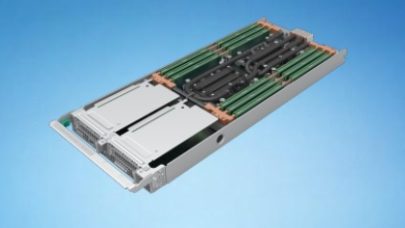
Semiconductor Companies Create Building Block for Chiplet Design
January 24, 2023
Intel's CEO Pat Gelsinger last week made a grand proclamation that chips will be for the next few decades what oil and gas was to the world over the last 50 years. While that remains to be seen, two technology associations are joining hands to develop building blocks to stabilize the development of future chip designs. The goal of the standard is to set the stage for a thriving marketplace that fuels... Read more…

Blueprints to Shake up Next-generation Server Designs Emerge at OCP Summit
October 24, 2022
A new generation of designs ready to shake up conventional server architecture emerged at the recent Open Compute Project Summit, where Google, Facebook and Mic Read more…

Penguin Computing Brings Cascade Lake-AP to OCP Form Factor
July 7, 2020
Penguin Computing, a subsidiary of SMART Global Holdings, Inc., announced yesterday (July 6) a new Tundra server, Tundra AP, that is the first to implement the Read more…

Inspur Takes OCP Beyond Hyperscalers
May 12, 2020
Inspur, China’s server leader, is expanding its AI offerings based on Open Compute Project specifications, including an OCP “cloud optimized” server geare Read more…

Chiplet Effort Advances for Workload Acceleration
September 27, 2019
Chiplet-based designs, so called because they combine multiple components into a single package, are increasingly seen as addressing the inability of general-pu Read more…

- Click Here for More Headlines

Whitepaper
Transforming Industrial and Automotive Manufacturing
In this era, expansion in digital infrastructure capacity is inevitable. Parallel to this, climate change consciousness is also rising, making sustainability a mandatory part of the organization’s functioning. As computing workloads such as AI and HPC continue to surge, so does the energy consumption, posing environmental woes. IT departments within organizations have a crucial role in combating this challenge. They can significantly drive sustainable practices by influencing newer technologies and process adoption that aid in mitigating the effects of climate change.
While buying more sustainable IT solutions is an option, partnering with IT solutions providers, such and Lenovo and Intel, who are committed to sustainability and aiding customers in executing sustainability strategies is likely to be more impactful.
Learn how Lenovo and Intel, through their partnership, are strongly positioned to address this need with their innovations driving energy efficiency and environmental stewardship.
Download Now
Sponsored by Lenovo
Whitepaper
How Direct Liquid Cooling Improves Data Center Energy Efficiency
Data centers are experiencing increasing power consumption, space constraints and cooling demands due to the unprecedented computing power required by today’s chips and servers. HVAC cooling systems consume approximately 40% of a data center’s electricity. These systems traditionally use air conditioning, air handling and fans to cool the data center facility and IT equipment, ultimately resulting in high energy consumption and high carbon emissions. Data centers are moving to direct liquid cooled (DLC) systems to improve cooling efficiency thus lowering their PUE, operating expenses (OPEX) and carbon footprint.
This paper describes how CoolIT Systems (CoolIT) meets the need for improved energy efficiency in data centers and includes case studies that show how CoolIT’s DLC solutions improve energy efficiency, increase rack density, lower OPEX, and enable sustainability programs. CoolIT is the global market and innovation leader in scalable DLC solutions for the world’s most demanding computing environments. CoolIT’s end-to-end solutions meet the rising demand in cooling and the rising demand for energy efficiency.
Download Now
Sponsored by CoolIT
Advanced Scale Career Development & Workforce Enhancement Center
Featured Advanced Scale Jobs:
HPCwire Resource Library
HPCwire Product Showcase
© 2024 HPCwire. All Rights Reserved. A Tabor Communications Publication
HPCwire is a registered trademark of Tabor Communications, Inc. Use of this site is governed by our Terms of Use and Privacy Policy.
Reproduction in whole or in part in any form or medium without express written permission of Tabor Communications, Inc. is prohibited.
























